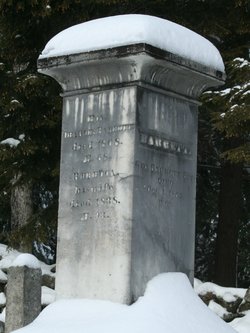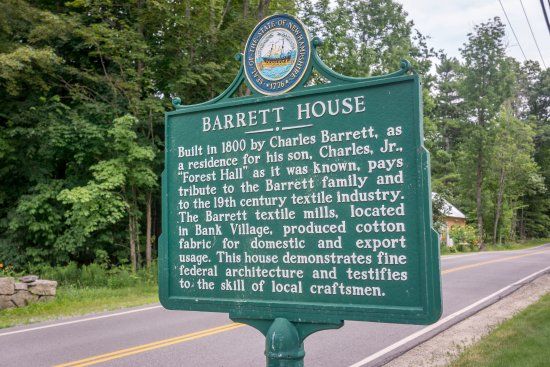He left Concord in early manhood, and after a brief sojourn in that part of Mason which is now Greenville, where his characteristic business habits were foreshadowed by his part with a brother in the erection of a saw and grist mill, at about the period of his marriage in 1764, he settled in New Ipswich.At first he was near the Mason line, (1 : 2, S. R.,) in which neighborhood he quickly became a leader; in 1780 he removed to the Center Village, and purchased the Joseph Kidder lot,(IX: 1, S. R.,) then considered a proverbially poor tract of land, but destined to show very different capabilities under the handling of its new manager. He there built for his residence the "Bullard house," just north from the well-known Barrett mansion of later days, which he built 25 years after for the second bearer of his name.The business operations upon which he entered seem almost petty when compared with the activities of the twentieth century, but at that period a journey to New York was a greater undertaking than is a trip to the Pacific coast in the present days. The settlement of Barrettstown, now known as Hope, in Lincoln county, Me., the erection of the mill upon the neighboring George's River, the construction of canals and locks upon the same river, the aid given to the glass manufacturer just across the Temple line upon Kidder Mountain, and the cotton mills of the town, said to have been undertaken at his suggestion and with his cooperation, all these were enterprises to be promoted only by a man of broad outlook and exceptional business confidence and sagacity. That he had ability to know when he saw a man, is illustrated by the incident related in the account of the Appleton family on a previous page. This power doubtless had a part in making it true that his failure to take a position satisfactory to his fellow townsmen, in the "times that tried men's souls" when the nation had its birth, did not permanently alienate public feeling, as is conclusively shown, not merely by his repeated elections to represent New Ipswich in the Legislature, and in the convention called to ratify the national Constitution, but also by the votes from a larger territory giving him place as a state senator and as councillor.
Parents: Thomas Barrett and Mary Jones
Married: Rebecca Minott 1764
Children: Charles, Dorcas, Charles, George, Rebecca, Seth.
Source: The History of New Ipswich, N.H. 1735-1914, Charles Henry Chandler, page 212,213,214.
He left Concord in early manhood, and after a brief sojourn in that part of Mason which is now Greenville, where his characteristic business habits were foreshadowed by his part with a brother in the erection of a saw and grist mill, at about the period of his marriage in 1764, he settled in New Ipswich.At first he was near the Mason line, (1 : 2, S. R.,) in which neighborhood he quickly became a leader; in 1780 he removed to the Center Village, and purchased the Joseph Kidder lot,(IX: 1, S. R.,) then considered a proverbially poor tract of land, but destined to show very different capabilities under the handling of its new manager. He there built for his residence the "Bullard house," just north from the well-known Barrett mansion of later days, which he built 25 years after for the second bearer of his name.The business operations upon which he entered seem almost petty when compared with the activities of the twentieth century, but at that period a journey to New York was a greater undertaking than is a trip to the Pacific coast in the present days. The settlement of Barrettstown, now known as Hope, in Lincoln county, Me., the erection of the mill upon the neighboring George's River, the construction of canals and locks upon the same river, the aid given to the glass manufacturer just across the Temple line upon Kidder Mountain, and the cotton mills of the town, said to have been undertaken at his suggestion and with his cooperation, all these were enterprises to be promoted only by a man of broad outlook and exceptional business confidence and sagacity. That he had ability to know when he saw a man, is illustrated by the incident related in the account of the Appleton family on a previous page. This power doubtless had a part in making it true that his failure to take a position satisfactory to his fellow townsmen, in the "times that tried men's souls" when the nation had its birth, did not permanently alienate public feeling, as is conclusively shown, not merely by his repeated elections to represent New Ipswich in the Legislature, and in the convention called to ratify the national Constitution, but also by the votes from a larger territory giving him place as a state senator and as councillor.
Parents: Thomas Barrett and Mary Jones
Married: Rebecca Minott 1764
Children: Charles, Dorcas, Charles, George, Rebecca, Seth.
Source: The History of New Ipswich, N.H. 1735-1914, Charles Henry Chandler, page 212,213,214.
Gravesite Details
Buried: Sept 21, 1808
Family Members
Advertisement
Records on Ancestry
Advertisement













